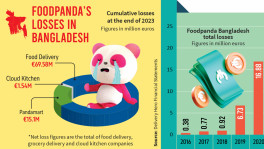Why do project costs and duration get out of hand every time?
Last year on 8 December, the Prime Minister Sheikh Hasina expressed her dissatisfaction at the regular Ecnec meeting over frequent time extensions and rising cost of development projects

In Bangladesh, the rise in cost and duration of government projects, once it is underway, borders on ridiculous.
In 2010, Bangladesh Railway took up the project of the Dohazari to Cox's Bazar railway line construction at an estimated cost of Tk1,852 crore. Eleven years later, the project is yet to be completed (only 42% completed till August last year), while the cost has increased 10 times to more than Tk18,000 crore.
The Mouchak-Moghbazar flyover was scheduled to start in 2011 and completed by December 2015. It finally began in 2013 and its primary estimated cost was Tk773 crore.
During the implementation phase, it was found that the design was faulty. After several extensions, the final cost of the project stood at Tk1,135 crore.
In the latest instance of such mismanagement, more than Tk70 crore was allocated to the health ministry in 2017 for a five-year long 'Clinical Contraceptive Services Delivery Programme' to develop the skills of doctors, nurses and paramedics in family planning. The programme has already spent as much as five times the allocation on paying honorarium to trainees. At the same time, implementation has been miserably low.
These are only a few examples. Many development projects have taken longer to implement, raising project implementation costs manifold, whose burden ultimately falls on the taxpayers.
Last year on 8 December, the Prime Minister Sheikh Hasina expressed her dissatisfaction at the regular Ecnec meeting over frequent time extensions and rising cost of development projects.
The premier warned government officials and gave directives to end such practices.
So why is implementation delayed and why do costs rise?
In 2018, think-tank Centre for Policy Dialogue (CPD) conducted a study on the 10 fast-tract projects. They found that the cost and time extension of development projects becomes two to three times higher than the primarily estimated costs.
'Our feasibility studies are substandard'

Professor Mustafizur Rahman
Distinguished fellow, Centre for Policy Dialogue (CPD)
There are many reasons behind the delay in implementing development projects in our country.
On many occasions the projects are not designed well and as a result, while implementing a project, the project authority has to change designs.
Another major reason is that when the government drafts a plan to acquire a piece of land, the news spreads in the area and some vested quarters file cases with the courts to try to benefit from it. This slows down the process.
The donors also attach many conditions in procurement and intervene in the process of employing consultants.
To fulfill the donors' conditions, it takes time to implement the projects on time. And these problems arise even before the implementation of a project.
The delay also happens due to import of machineries and lack of specialised manpower.
The frequent changing of project directors also hampers the project implementation.
When a new project director takes charge, it takes some time for her/him to understand the project's different issues. The new directors also make changes to the plan.
As a result, the project loses continuity. Whenever a delay happens, the project cost increases, because the price of things also increases.
Moreover, the government has to negotiate with the donor agency, which also takes some more time.
Sometimes the budget allocation also remains insufficient to implement the project. The government does not allocate the amount a project needs to be completed. So the process becomes slow.
In many cases, our feasibility studies are substandard, due to which the problem arises at the time of implementation. As a result, it takes time to implement the projects.
The government will have put more emphasis on the feasibility studies.
Moreover, it will have to provide incentives to the project directors who perform well and sanction those who perform poorly.
To rid ourselves of these problems, the projects need to be monitored more and they need to be included in the Annual Performance Agreement.
'We should not look at this completely negatively'

Ali Imam Majumder
Former cabinet secretary
We should not look at this completely negatively.
Firstly, after taking up a project, when it appears that a component needs to be increased, only then do the costs increase.
For example, there is a plan to make a 10-kilometer road, and later it is decided that five more kilometers need to be constructed. Then the cost will surely grow.
Secondly, if the time period is extended to complete the project, naturally, with time, the price of things will increase. So the implementation cost will also increase.
Normally, when a project implementation is delayed and the cost increases, it has a negative impact on the whole economy.
But this will not be the case if the project implementation expense increases due to more work.
However, if the project implementation is delayed purposefully and due to inefficiency and negligence, then it will ultimately have a negative impact on the economy.
Ordinary people have to suffer because they are the taxpayers.
Another reason that hinders project implementation is bureaucratic complexities.
When a project proposal is presented and implemented, it has to go through many stages until it reaches the final implementation stage.
Corruption is also definitely pushing up the development projects' costs.
When the project proposal is drafted, the price of land is estimated to be a certain amount but when buying the land, the price turns out to be much higher. This happens because many landowners erect buildings to sell the lands at a higher price.
Some government officials and land owners involved in the land acquisition process ramp up the price for their own benefit.


 Keep updated, follow The Business Standard's Google news channel
Keep updated, follow The Business Standard's Google news channel
















